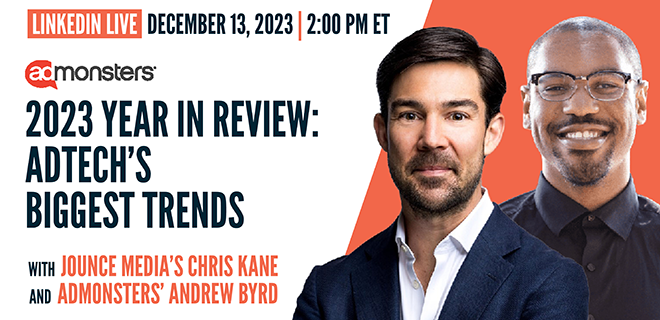
In 2023, the ad tech hot topics were boiling, and we explored some of the juiciest ones in our LinkedIn Live, “AdMonsters 2023 Recap W/ Chris Kane, Founder of Jounce Media.”
If you missed the thrill of our AdMonsters 2023 Recap LinkedIn Live, fear not – we’ve got the highlights, the insights, and all the scoop you need right here. We dove headfirst into the hottest topics of last year and peeked into the crystal ball for 2024, all in the company of the ever-insightful Chris Kane.
Who foresaw MediaMath’s dramatic twists? Is the industry truly braced for the post-Chrome cookie era? Are walled gardens forever?
We have the tea, so check out the video streaming below. It was a must-see discussion.
Chrome Cookie Deprecation
Chrome’s deprecation of third-party cookies will significantly impact digital advertising. Chris Kane said, “We’re going to have a big frigging emergency whenever it is that cookies are fully deprecated. And I think a lot of companies are going to get caught flat-footed.”
There is a disparity in approaches among ad tech companies, some dedicating resources to building support for Chrome APIs, while others opt for alternative solutions to thrive in a post-cookie open web. Kane also predicts a shift towards probabilistic identity solutions, enabling bid requests to maintain functionality even in non-cookied environments like Safari.
However, he warns of a potential attribution crisis, suggesting that while ad tech focuses on targeting solutions, it overlooks building future-proofed attribution systems, possibly leading to challenges in measuring ad effectiveness and driving business outcomes in the future.
MediaMath Bankruptcy
MediaMath’s bankruptcy reverberated across the ad tech industry. I mean, they did leave behind a $100 million debt. Kane was surprised to see MediaMath go bankrupt rather than being acquired.
“Notably, the bankruptcy spurred a heightened sense of urgency among publishers to comprehend counter-party risk, leading to the implementation of improved financial controls,” said Kane. There were only a few SSPs that opted to waive sequential liability clauses, leaving publishers to grapple with the ramifications. Publishers wondered if all would fall to them.
However, the resurrection of MediaMath by Infillion could ease some publishers’ concerns. Kane advocates for “a pragmatic approach instead of emotional reactions despite those who were burned by MediaMath’s bankruptcy.”
Big Tech Regulation
In 2023, the tech industry witnessed a surge in antitrust lawsuits against big tech companies like Google, Meta (formerly Facebook), Apple, and Amazon sparking discussions about their triopolistic control over ad tech.
Kane was doubtful that these lawsuits would bring about major changes, stating, “It seems very unlikely to me that on any kind of reasonable timeline, there’s going to be any kind of restructuring of the Google ad tech business.”
In contrast, he praises the power of independent ad tech. “While big tech moves slowly due to regulatory constraints, independent ad tech demonstrates agility, outmaneuvering giants like Google and Amazon amid regulatory pressures,” he shared. Kane predicts a scenario where independent ad tech could gain market share due to their ability to innovate and adapt faster than the entrenched walled gardens.
Supply Chain Complexity
Supply chain complexity within programmatic advertising has become increasingly convoluted, leading to what Kane identifies as “bid stream bloat.”
For example, he said, “DSPs receive a filtered view of the available supply, encountering an excess of duplicated high-value impressions while remaining unaware of lower and medium value ones. As this issue intensifies, it adversely affects the unit economics of ad tech companies, particularly SSPs. The costs incurred by SSPs for processing auctions contrast with their revenue generation from cleared impressions, resulting in deteriorating unit economics.”
While acknowledging the need for a solution, Kane expresses uncertainty about how to navigate this complex issue effectively. He suggests a potential approach where DSPs directly integrate with publishers through mechanisms like prebid. This can streamline the process by encountering only one bid request for each available impression.
MFA Sites
The MFA debate started in 2020 when the industry wanted to understand ad arbitrage publishers, according to Kane. The discussion heated in 2023 in June when an ANA Publishers’ Report revealed that 15% of allocated ad spend went towards MFA publishers.
Following this revelation, the industry witnessed both positive and negative shifts.
Positive shift: SSPs, DSPs, verification companies, and agencies took action that led to a reduction in MFA spend.
Negative Shift: Publishers feared that reputable media companies could suffer economically due to inadvertent misclassifications. Kane stresses the importance of transparency in classification decisions but acknowledges the industry’s current lack of readiness in this regard.